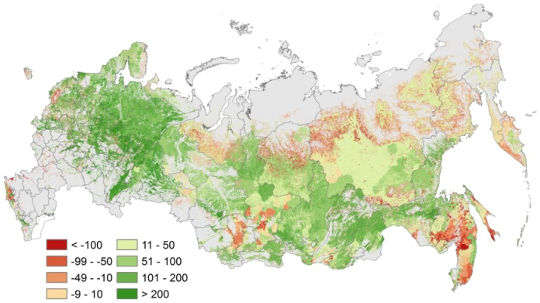Terrestrial ecosystems full verified GHG budget
Currently three projects are involved in further elaboration of methodology to reduce the uncertainties of GHG emissions in Poland, Russia, and Ukraine. These are GESAPU for Poland and Ukraine, and NEFCA and ZAPAS for Russia.
To comply with Kyoto Protocol commitments to reduce greenhouse gas emissions, countries need to know what their actual emissions are—a challenging task involving significant uncertainties. Especially in countries that are heavily forested or have large areas of differentiate terrain, the policy implications of incomplete data are serious and ESM is working to reduce the uncertainties as much as possible [1] [2] [3] [4] [5].
References
[1] Shvidenko AZ, Gustafson E, McGuire AD, Kharuk VI, Schepaschenko DG, Shugart HH et al. (2013). Terrestrial ecosystems and their change. Chapter 6 in P.Ya. Groisman, G. Gutman (ed) Regional Environmental Changes in Siberia and Their Consequences. Springer. – P. 171-250.
[2] Santoro M, Cartus O, Fransson JES, Shvidenko A, McCallum I, Hall RJ, Beaudoin A, Beer C, Schmullius C (2013). Estimates of forest growing stock volume for Sweden, Central Siberia, and Quebec using Envisat Advance Synthetic Aperture Radar backscatter data. Remote Sensing, 4, 4503-4532; doi: 10.3390/rs5094503.
[3] Shvidenko AZ, Schepaschenko DG (2013). Climate change and wildfires in Russia. Contemporary Problems of Ecology, Vol. 6, No 7, pp. 683-692.
[4] Shvidenko A, Schepaschenko D, Kraxner F, Obersteiner M (2013). Terrestrial ecosystems full carbon account as a fuzzy system: an attempt to understand uncertainties. Plenary presentation at the 9th International CO2 Conference, Beijing, 3-7 June 2013 (CD ROM).
[5] Shvidenko A, Schepaschenko D, McCallum I (2013). Integration of remote sensing and ground methods in research of carbon cycling of Russian forests. In “Aerospace methods and GIS-technologies in forestry and forest management. Proceedings of the V All-Russian Conference dedicated to the memory of V.I. Sukhikh and G.N. Korovin. Moscow, Russia, April 22-24, 2013. – M., CEPF RAS, 2013, pp. 92-96.
Collaborators
Systems Research Institute, Polish Academy of Sciences. Warsaw, Poland;
National Institute for Environmental Studies, Japan;
National University of Life Sciences of Ukrain, Kiev, Ukraine;
National Forest Technical University of Ukraine, Lviv, Ukraine;
Friedrich Schiller University Jena, Germany;
Advanced Systems Analysis Program (ASA), IIASA.

Research program



